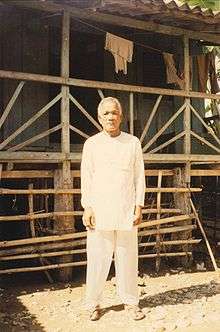Rabha tribe

Rabha (also Rava) is an indigenous Assamese community of the Indian states of Assam, Meghalaya and West Bengal. The language/dialect spoken by the Rabha people is mostly Assamese but in some areas the Rabha dialect is also spoken. In Assam, the Rabhas live mostly in Goalpara and Kamrup districts. In Meghalaya, Rabhas are mostly found in Garo Hills districts. In West Bengal, Rabha people mainly live in Jalpaiguri district and Cooch Behar district. Moreover, almost, 70 per cent of them live in Jalpaiguri district. The whole area of Eastern and Western Dooars, may be termed as the cradle land of the Rabhas. The Rabhas refer to themselves as Koch and assert a connection to the historical Koch Kingdom.
Ethnicity and language
The Rabhas belong to the Indo Mongoloid group of people and have similarities with other members of Koch group such as Garos, Kachari, Mech, Koch, Hajong and others.[1] Most of the Rabhas of Dooars refer to themselves as Rabha, but some of them often declare themselves as Kocha.[2]
Religion and culture

Rabha people traditionally practice a few animistic rituals. However, today they more often follow a faith, which is a blend of some Hindu and a few animistic rituals. There are considerable differences in ritual practices among forest Rabhas who still live in the forest villages and the Rabhas that live in the villages as cultivators. The forest Rabhas follow traditional animistic practices tinged with some rituals of mainstream Hinduism. On the other hand, village Rabhas have merged with local Hindus as far as their religious practices are concerned.[4]
Rabha people's religious world is pervaded with various spirits and natural objects. The main deity of the Rabhas is called Rishi. Rishi, for the forest Rabhas as well as village Rabhas, is a male deity. He is also known as Mahakal. Forest Rabhas worship him in all important social and religious ceremonies.[5]
See also
References
Citations
- ↑ Mitra 1953, p. cxxxviii
- ↑ Karlsson 2000, pp. 55–8
- ↑ Census of India - Socio-cultural aspects, Table ST-14, Government of India, Ministry of Home Affairs, 2001
- ↑ Das & Raha 1967, p. 130
- ↑ Karlsson 2000, p. 162
Bibliography
- Mitra, A. (1953), West Bengal: District Handbooks: Jalpaiguri, Govt. of West Bengal
Further reading
- Saha, Rebatimohon (1987) "Jalpaiguri Jelar Koch-Rabha Samaj" (in Bengali) published in AnandaGopal Ghosh edited Madhuparni, Special issue on Jalpaiguri District.
- Raha, M.K. (1974) "The Rabhas of Western Duars: Structural Analysis of a Changing Matrilineal Society", Bulletin of the Cultural Research Institute, Vol. 10 (1 & 2).
- Ghosh, Saumitra (1990) "Vanbasi Rabhara" (in Bengali) Desh, Vol 57 (12), January 20.
- Roy Choudhury, B. (1970) "Social Mobility Movement among the Rabhas of North Bengal", Man in India, Vol 50 (1).
- Gupta, Pabitra Kumar (1977) "Uttarbanger Rahba Samaj O Dharmasanskar Aandolon", (in Bengali) in Madhuparni: Special North Bengal Issue, 1977.